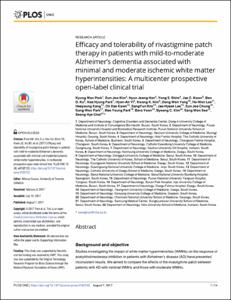Efficacy and tolerability of rivastigmine patch therapy in patients with mild-to-moderate Alzheimer’s dementia associated with minimal and moderate ischemic white matter hyperintensities: A multicenter prospective open-label clinical trial
- Keimyung Author(s)
- Yi, Hyon Ah
- Department
- Dept. of Neurology (신경과학)
- Journal Title
- PLoS One
- Issued Date
- 2017
- Volume
- 12
- Issue
- 8
- Abstract
- BACKGROUND AND OBJECTIVE:
Studies investigating the impact of white matter hyperintensities (WMHs) on the response of acetylcholinesterase inhibitors in patients with Alzheimer's disease (AD) have presented inconsistent results. We aimed to compare the effects of the rivastigmine patch between patients with AD with minimal WMHs and those with moderate WMHs.
METHODS:
Three hundred patients with mild to moderate AD were enrolled in this multicenter prospective open-label study and divided into two groups. Group 1 comprised patients with AD with minimal WMHs and group 2 comprised those with moderate WMHs. The patients were treated with a rivastigmine patch for 24 weeks. Efficacy measures were obtained at baseline and after 24 weeks. The primary endpoint was the change in the AD Assessment Scale-Cognitive subscale (ADAS-Cog) from the baseline to the end of the study.
RESULTS:
Of the 300 patients, there were 206 patients in group 1 and 94 patients in group 2. The intention-to-treat group comprised 198 patients (group 1, n = 136; group 2, n = 46) during the 24-week study period. Demographic factors did not differ between group 1 and group 2. There were no significant differences in change in ADAS-cog between group 1 (-0.62±5.70) and group 2 (-0.23±5.98) after the 24-week rivastigmine patch therapy (p = 0.378). The patients in group 1 had a 0.63-point improvement from baseline on the Frontal Assessment Battery, while group 2 had a 0.16-point decline compared to baseline at the end of the study (p = 0.037). The rates of adverse events (AEs) (42.6 vs. 40.3%) and discontinuation due to AEs (10.3% vs. 4.3%) did not differ between the groups.
CONCLUSIONS:
Although the efficacy and tolerability of rivastigmine patch therapy were not associated with WMH severity in patients with AD, some improvement in frontal function was observed in those with minimal WMHs.
TRIAL REGISTRATION:
ClinicalTrials
- Keimyung Author(s)(Kor)
- 이현아
- Publisher
- School of Medicine (의과대학)
- Citation
- Seong Hye Cho et al. (2017). Efficacy and tolerability of rivastigmine patch therapy in patients with mild-to-moderate Alzheimer’s dementia associated with minimal and moderate ischemic white matter hyperintensities: A multicenter prospective open-label clinical trial. PLoS One, 12(8), e0182123–e0182123. doi: 10.1371/journal.pone.0182123
- Type
- Article
- ISSN
- 1932-6203
- Appears in Collections:
- 1. School of Medicine (의과대학) > Dept. of Neurology (신경과학)
- 파일 목록
-
-
Download
 oak-2018-0448.pdf
기타 데이터 / 1.74 MB / Adobe PDF
oak-2018-0448.pdf
기타 데이터 / 1.74 MB / Adobe PDF
-
Items in Repository are protected by copyright, with all rights reserved, unless otherwise indicated.